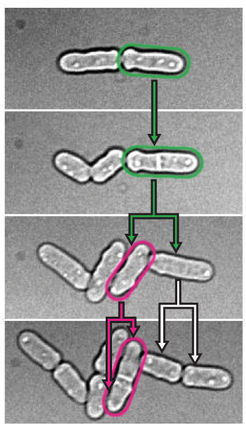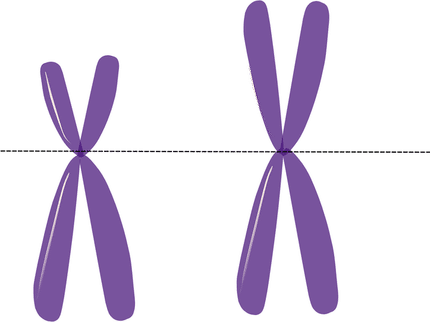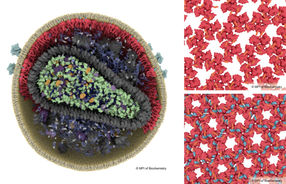Immune to ageing
Max Planck researchers discover a microbe that is rejuvenated every time it reproduces
While ageing remains an inevitable fact of life, Max Planck researchers have discovered a microbe that stays forever young by rejuvenating every time it reproduces. The findings provide fundamental insights into the mechanisms of ageing.

Three generations of yeast cells from the mother cell (green) via two daughters (red) to four granddaughter cells.
© MPI f. Molecular Cell Biology and Genetics
In general, even symmetrically dividing microbes do not split into two exactly identical halves. Detailed investigations revealed that there are mechanisms in place that ensure that one half receives older, often defective, cell material, whereas the other half is equipped with new fully-functional material. So microbes produce offspring that is younger than the parent – like is the case with humans.
The research team showed that, unlike other species, the yeast Schizosaccheromyces pombe is immune to ageing when reproducing under favourable growth conditions. When the yeast is treated well, it reproduces by splitting into two halves that both inherit their fair share of old cell material. As both cells get only half of the damaged material, they are both younger than before. “The yeast is rejuvenated a bit every time it reproduces,” explains Iva Tolic-Norrelykke, research group leader at the Max Planck Institute of Molecular Cell Biology and Genetics in Dresden and lead investigator on the project.
Once subjected to negative influences like chemicals or heat, the yeast cells started splitting into a younger and an older half just like other cells. While the older cells eventually died, their offspring survived long enough to reproduce even in the harsh environments. The findings highlight S. pombe as an interesting organism that could potentially serve as a model of certain non-ageing types of cells in humans, such as germ cells, stem cells and cancer cells.
Original publication
Miguel Coelho, Aygül Dereli, Anett Haese, et al., Fission yeast does not age under favorable conditions, but does so after stress Current Biology, 12. September 2013
Original publication
Miguel Coelho, Aygül Dereli, Anett Haese, et al., Fission yeast does not age under favorable conditions, but does so after stress Current Biology, 12. September 2013
Topics
Organizations
Other news from the department science

Get the life science industry in your inbox
By submitting this form you agree that LUMITOS AG will send you the newsletter(s) selected above by email. Your data will not be passed on to third parties. Your data will be stored and processed in accordance with our data protection regulations. LUMITOS may contact you by email for the purpose of advertising or market and opinion surveys. You can revoke your consent at any time without giving reasons to LUMITOS AG, Ernst-Augustin-Str. 2, 12489 Berlin, Germany or by e-mail at revoke@lumitos.com with effect for the future. In addition, each email contains a link to unsubscribe from the corresponding newsletter.





















































